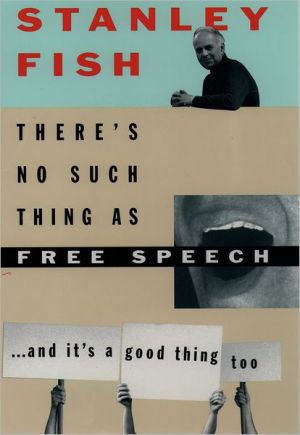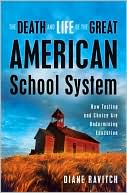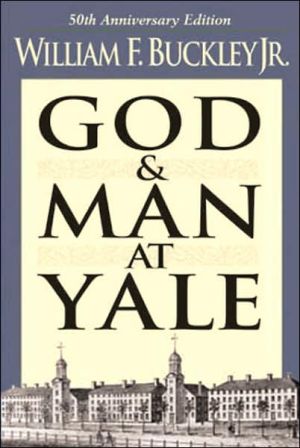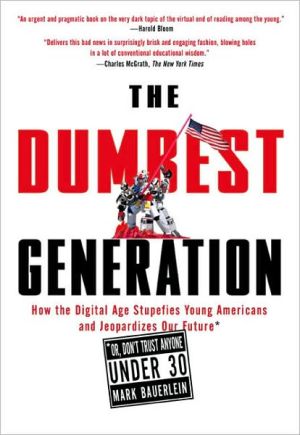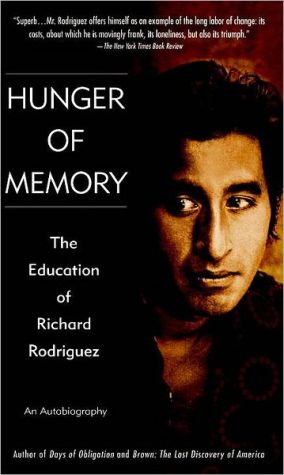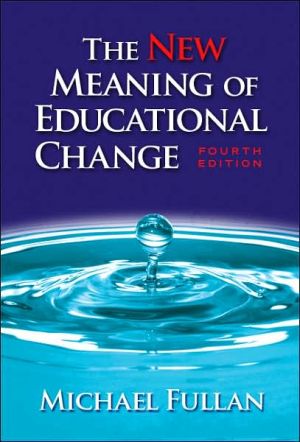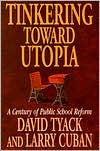There's No Such Thing as Free Speech: And It's a Good Thing, Too
In an era when much of what passes for debate is merely moral posturing--traditional family values versus the cultural elite, free speech versus censorship--or reflexive name-calling--the terms "liberal" and "politically correct," are used with as much dismissive scorn by the right as "reactionary" and "fascist" are by the left--Stanley Fish would seem an unlikely lightning rod for controversy. A renowned scholar of Milton, head of the English Department of Duke University, Fish has emerged...
Search in google:
In an era when much of what passes for debate is merely moral posturing—traditional family values versus the cultural elite, free speech versus censorship—or reflexive name-calling—the terms "liberal" and "politically correct," are used with as much dismissive scorn by the right as "reactionary" and "fascist" are by the left—Stanley Fish would seem an unlikely lightning rod for controversy. A renowned scholar of Milton, head of the English Department of Duke University, Fish has emerged as a brilliantly original critic of the culture at large, praised and pilloried as a vigorous debunker of the pieties of both the left and right. His mission is not to win the cultural wars that preoccupy the nation's attention, but rather to redefine the terms of battle. In There's No Such Thing as Free Speech, Fish takes aim at the ideological gridlock paralyzing academic and political exchange in the nineties. In his witty, accessible dissections of the swirling controversies over multiculturalism, affirmative action, canon revision, hate speech, and legal reform, he neatly eviscerates both the conservatives' claim to possession of timeless, transcendent values (the timeless transcendence of which they themselves have conveniently identified), and the intellectual left's icons of equality, tolerance, and non-discrimination. He argues that while conservative ideologues and liberal stalwarts might disagree vehemently on what is essential to a culture, or to a curriculum, both mistakenly believe that what is essential can be identified apart from the accidental circumstances (of time and history) to which the essential is ritually opposed. In the book's first section, which includes the five essays written for Fish's celebrated debates with Dinesh D'Souza (the author and former Reagan White House policy analyst), Fish turns his attention to the neoconservative backlash. In his introduction, Fish writes, "Terms that come to us wearing the label 'apolitical'—'common values', 'fairness', 'merit', 'color blind', 'free speech', 'reason'—are in fact the ideologically charged constructions of a decidedly political agenda. I make the point not in order to level an accusation, but to remove the sting of accusation from the world 'politics' and redefine it as a synonym for what everyone inevitably does." Fish maintains that the debate over political correctness is an artificial one, because it is simply not possible for any party or individual to occupy a position above or beyond politics. Regarding the controversy over the revision of the college curriculum, Fish argues that the point is not to try to insist that inclusion of ethnic and gender studies is not a political decision, but "to point out that any alternative curriculum—say a diet of exclusively Western or European texts—would be no less politically invested." In Part Two, Fish follows the implications of his arguments to a surprising rejection of the optimistic claims of the intellectual left that awareness of the historical roots of our beliefs and biases can allow us, as individuals or as a society, to escape or transcend them. Specifically, he turns to the movement for reform of legal studies, and insists that a dream of a legal culture in which no one's values are slighted or declared peripheral can no more be realized than the dream of a concept of fairness that answers to everyone's notions of equality and jsutice, or a yardstick of merit that is true to everyone's notions of worth and substance. Similarly, he argues that attempts to politicize the study of literature are ultimately misguided, because recharacterizations of literary works have absolutely no impact on the mainstream of political life. He concludes his critique of the academy with "The Unbearable Ugliness of Volvos," an extraordinary look at some of the more puzzing, if not out-and-out masochistic, characteristics of a life in academia. Penetrating, fearless, and brilliantly argued, There's No Such Thing as Free Speech captures the essential Fish. It is must reading for anyone who cares about the outcome of America's cultural wars. Publishers Weekly Head of Duke University's English Department and putative flag-bearer for political correctness, Fish here collects a lively and vigorous sampling of his cultural criticism. Notable are his textured essays written for a series of campus debates with conservative Dinesh D'Souza. Fish places such current education controversies as those over multiculturist requirements in historical perspective; scores simplistic critics of affirmative action; suggests self-segregation can be justified as an exercise of autonomy; and observes that political power and `` real political correctness'' is determined by the ``triple threat of money, media domination and governmental regulation.'' His provocative title essay argues cogently that the neat legal definition between speech and conduct breaks down in concrete examples. In more abstruse essays, Fish turns his analytic skills, honed in literarycriticism, to dissect some of the presumptions of legal thought. If the essays do range a bit, they are linked by a skeptical and probing voice. (Nov.)
1Introduction: "That's Not Fair"32The Common Touch, or, One Size Fits All31Preface to Chapters 3 through 7513The Empire Strikes Back534Reverse Racism, or, How the Pot Got to Call the Kettle Black605You Can Only Fight Discrimination with Discrimination706Bad Company807Speaking in Code, or, How to Turn Bigotry and Ignorance into Moral Principles898There's No Such Thing as Free Speech, and It's a Good Thing, Too1029Jerry Falwell's Mother, or, What's the Harm?12010Liberalism Doesn't Exist13411The Law Wishes to Have a Formal Existence14112Play of Surfaces: Theory and the Law18013Almost Pragmatism: The Jurisprudence of Richard Posner, Richard Rorty, and Ronald Dworkin20014Being Interdisciplinary Is So Very Hard to Do23115The Young and the Restless24316Milton's Career and the Career of Theory25717Milton, Thou Shouldst Be Living at This Hour26718The Unbearable Ugliness of Volvos273Appendix. Fish Tales: A Conversation with "The Contemporary Sophist"281Notes309Index319
\ Publishers Weekly - Publisher's Weekly\ Head of Duke University's English Department and putative flag-bearer for political correctness, Fish here collects a lively and vigorous sampling of his cultural criticism. Notable are his textured essays written for a series of campus debates with conservative Dinesh D'Souza. Fish places such current education controversies as those over multiculturist requirements in historical perspective; scores simplistic critics of affirmative action; suggests self-segregation can be justified as an exercise of autonomy; and observes that political power and `` real political correctness'' is determined by the ``triple threat of money, media domination and governmental regulation.'' His provocative title essay argues cogently that the neat legal definition between speech and conduct breaks down in concrete examples. In more abstruse essays, Fish turns his analytic skills, honed in literarycriticism, to dissect some of the presumptions of legal thought. If the essays do range a bit, they are linked by a skeptical and probing voice. (Nov.)\ \ \ \ \ Library JournalGates, probably the best known and most controversial proponent of African American studies, has gathered here a group of his essays on the timely topic of multiculturalism. Selections fit the broad categories of ``Literature,'' ``The Profession,'' and ``Society,'' discussing issues of curricular modification and the ramifications beyond the academy of such changes. While most of the material is reprinted from other sources, some of the essays are slightly revised, and two were originally given as talks, including the MLA address, ``Goodbye Columbus?'' In addition to cogent essays on the value of cultural pluralism, there are two delightful Dashiell Hammett-style investigations into the literary canon that first appeared in the New York Times Book Review. An excellent addition to all academic libraries and a necessity for any library interested in a serious discussion of multiculturalism.-- Marie F. Jones, Muskingum Coll. Lib., New Concord, Ohio\ \ \ Lief CarterVirtually all students of law, the social sciences, and social philosophy should read Stanley Fish's new collection of essays (from the late 1980s to 1993.) That said, different subsets of us will have very different payoffs for doing so. Indeed, the central argument in nearly all Fish's work holds that our readings and interpretations necessarily depend on the particular rhetorical and political communities to which we belong. We cannot escape or transcend them. Assuming for the moment that Fish is right, it makes no sense to review the book from any single homogeneous perspective, any more than it makes sense to assume that a performance of "Hamlet" ought to mean the same thing to a group of New York theater critics and to an audience of freshmen enrolled in introductory psychology (cf. p.97). Instead I'll describe how three -- among no doubt many -- audiences might benefit, each in distinctive ways, from taking this fishing expedition. First a bit more general description. Stanley Fish is, along with Richard Rorty and Martha Nussbaum, the most provocative writer in political philosophy in the United States today. He, as they, swims in post-modernism's mainstream. (Nussbaum, however, swims against the current.) Fish, its most flamboyant and entertaining writer, prompted Adam Begley (NEW YORK TIMES MAGAZINE, May 3, 1992) to call him a "souped-up, politically correct showman." Some of the titles of these nineteen essays boarder on clowning: "The Empire Strikes Back," "Jerry Falwell's Mother," "The Incredible Ugliness of Volvos," and the title essay, which carries the subtitle, "and It's a Good Thing, Too." The essays draw as much from such sources as the Broadway show, "How to Succeed in Business without Really Trying," as on Habermas; as much from David Duke as from Duke University, where Fish holds positions in English and the law school. Fish, once a scrappy, first-to-college kid from the flatlands of Providence, has described his work as a philosophical version of "Saturday Night Live." But Fish is no clown. He mounts here a strong pragmatic case for policies, including affirmative action, to improve the lives of the poor and powerless. Chapters three through seven were originally delivered in live campus debates with Dinesh D'Souza, a policy analyst in the Reagan administration and critic of "political correctness" in higher education. Fish debunks a reverence for a Western literary canon that squelches new voices. Above all, he makes the compelling case that all academic behavior, indeed all social behavior, is inescapably political. He argues that liberalism's fundamental premises -- particularly the public/private distinction and the existence of objective reason and transcendent values -- are incoherent. But here Fish throws us a curve. He argues that political philosophy will go on just as it has, for all it will ever have are its own constructed traditions. And it follows that we should read Fish to find out where he is wrong and where we may, consequently, aspire to retool political philosophy. I. Mainstream Social Science Positivists. A highly respected and self-effacing senior colleague in my department last term approached me in the mail room with a request: "Lief, it looks like postmodernism is here to stay, and I'm getting nervous that if I don't learn more about it, I'll become even more out of it than I am already. Why don't we organize a brown bag so that us old-fashioned empiricists can pick the brains of those of you familiar with the field?" I responded by promising to loan him my copy of this book. My colleague rightly predicts postmodernism's staying power, mainly because postmodernism's main claim is quite old and familiar: Essences are rhetorical contingencies forever under construction by the constantly changing symbolic activity of people. (Hence no speech can be truly free.) From the pre-Socratics to the American pragmatists, most famously James and Dewey, thinkers have already woven these insights into contemporary thought. In one form it is already a commonplace in both Page 34 follows: the philosophy of science and its practice. (Experiments can disprove nul hypotheses, but they can never prove THE TRUTH.) Postmodernism is new only in the sense that its rhetoric is "different." But, like learning to switch from one computer language or word processing program to another, the novelty seems at first a bitter pill. Fish's entertaining prose coats the pill. (The index situates "Davis, Bette," next to "Deconstruction" and "Feminism" next to "Fetchit, Stepin,".) But in three ways he removes its very bitterness. First, he familiarizes. He illustrates how we experience the contingency of concepts like fairness and merit and equality in daily practice. This is something every lawyer trained in common law knows. In the particularly effective essay, "Speaking in Code" (pp. 89-101), he reminds how easy it is to distinguish Martin Luther King's meaning from David Duke's despite the fact that Duke used surprisingly similar rhetoric about equal opportunity. Second, he engages moral issues. Many beginners wrongly equate postmodern thought with deconstructionism and its nihilistic implications. But deconstruction was merely positivism's last gasp, its final futile effort to focus the humanities's microscopes down far enough to see what is "really true." In fact, because all positions are contingent, Fish shows how we can mount a moral argument as defensibly as any other argument. Third, he draws a scholarly map. Readers unfamiliar with the field get at least thumbnail descriptions and criticisms of the field's major players -- Dworkin, Rorty, Posner, Nussbaum, and of course Wittgenstein. II. Committed Liberal Scholars. Sandy Muir, my major professor at Berkeley too many years ago, insists that good writing must always have something or someone to "write against." The liberal philosopher Cass Sunstein has effectively written against Fish in just this fashion in "The Professor's New Clothes," THE NEW REPUBLIC, December 6, 1993, pp. 42-46. Sunstein notes that the pragmatism Fish espouses was nourished by the liberal tradition and in no way need contradict it. Fish may rightly embrace metaphor of games and rightly argue that our political vocabulary is no truer than the vocabulary we use to play any game, but so what? Liberalism is still the game we play. Its language enables us to talk about whether to support public financing of elections or the fairness doctrine in broadcasting. The liberalism that Fish says "doesn't exist" turns out to be a pre- pragmatic caricature. Fish demonstrates its "nonexistence" via the very kind of scholastic syllogistic word-spinning that he elsewhere debunks: Liberalism defines its existence in terms of its difference from religion; its claim to truth is no less political and ideological than religion's; ergo, since the distinction is false, liberalism cannot exist (pp. 137-138). In short, Fish walks with pragmatic liberals out of the dark and gloomy woods of formalism and positivism into such an open field that it seems perverse for him to turn and run back into the woods. If we grant that liberalism seeks a rhetoric designed to minimize our tendency to slaughter fellow members of the species, do not the metaphors and rhetorics of games -- essentially peaceful activities -- lead us in a good direction? Why doesn't debunking the authoritarian's claim of correctness simply improve the liberal game, just as the forward pass improved football? Fish, so enamored of games, particularly tennis, seems competitively driven to try to defeat all challengers. He might try sitting on the rules committee. III. Postmodern Legal Scholars. Members of this audience who missed Fish's legal essays in Kearns and Sarat's THE FATE OF LAW (1991), Leyh's LEGAL HERMENEUTICS (1992), and Brint's PRAGMATISM IN LAW AND SOCIETY (1991) will find these must readings reprinted here. Fish's description of the legal process as doing "the business of producing the very authority it retroactively invokes" in order to buffer us from "a world without foundational essences" (p. 179) seems so familiar that we cannot help but take our experience of law as persuasive validation of much of Fish's position. But the game will go on, of course, so what's next? Here Fish implies a cornucopia of Page 35 follows: useful questions and pugnaciously refuses to answer any of them. Here are two sorts: 1. Why, if theory is self-referential, and indeterminate, do we persist in theorizing? Why do games need rules committees? Surely legal mechanisms in baseball or any other sport do pragmatic work -- make games possible. Why? Individual interpretive communities DO generate broad intersubjective agreement on many things? How? What, in other words, is this game we call politics and that Fish plays so zestfully. How do games and performances simultaneously create agreements and changes of agreements? 2. Grant that we academics, like everybody else, can justify the things we do only by invoking some transcending political values, are there no criteria for distinguishing better from worse justifications? Fish seems to deny that such criteria have any bite outside the performing of them, but he doesn't hesitate to perform them. He never hesitates to call an idea "so much wrong" (e.g., p. 44) or "exactly right" (e.g., p. 169). So Fish must have some sense of how, politically, we distinguish good from bad performances. Fish, like any good pragmatist, must have an aesthetic sense -- a sense of hypocrisy or a nose for internal self-contradiction, perhaps -- that he could share with us. But all he will say is that writing is his craft, that his role models are Austen and C.S.Lewis, and that his writing strives for clarity (p. 283). And so Fish, who aspires only to practice the craft of clarity, finally leaves his postmodern audience muttering in confusion, and in this sense he is wrong. He argues (p. 219) that pragmatism best describes the law but that this description has no close relation to the practice of law because description is a very different kind of performance practice than law practice. Grant the premise, but then it's hard to explain Fish's athletic zest to approve or condemn legal opinions. If Justice White rightly dissented from Justice O'Connor's rejection, in June of 1993, of North Carolina's districting scheme on the pragmatic ground that North Carolina's districting plan plainly achieved the purposes of the Voting Rights Act (pp. viii-ix), then judges CAN practice law pragmatically. At the close of the book, Fish dogmatically returns to the point that there is no point, "and therefore it would be contradictory for me to have a point beyond that point." (p. 307). To quote from A CHORUS LINE, "That ain't it, kid." Theories and points and rules can do pragmatic work without being correct. They build trust in the integrity of speakers and in their willingness to share conversations and games and communities with us. Come on, Stanley, get off the court and try sitting on pragmatism's rules committee for a change. Of course its just another game, but it's the game we academics would like to play with you better. REFERENCES Brint, Michael, ed. 1991. PRAGMATISM IN LAW AND SOCIETY. Boulder, Colorado: Westview Press. Leyh, Gregory, ed. 1992. LEGAL HERMENEUTICS: HISTORY, THEORY, AND PRACTICE. Berkeley: University of California Press. Sarat, Austin and Thomas R. Kearns, eds. 1991. THE FATE OF LAW. Ann Arbor: University of Michigan Press.\ \ \ \ \ Kirkus ReviewsSplendid essays by Milton scholar and literary theorist Fish (Doing What Comes Naturally, 1990, etc.; English/Duke) that express his centrist, mediating, pragmatic position in the recent cultural wars over theory, politics, and the place of literature in society. The first ten essays here derive from debates that Fish participated in with Dinesh D'Souza during a tour of college campuses in which Fish assumed the liberal position defending tolerance, equality, and nondiscrimination against D'Souza's conservative appeal to transcendent values. In a clear, eloquent, personable—if relentlessly logical—style, Fish reveals the hidden and self-defeating agendas of both sides, the self-deluding coercions of liberalism especially. Essentially, he argues that liberals create what they set out to avoid: tyranny, discrimination, censorship. Fish concludes that free speech can't be legislated; instead, it's "what is left over when a community has determined in advance what it does not want to hear." The rest of the text consists of the author's take on various academic issues—the impossibility of interdisciplinary studies; the ineffectualness of literary theory, especially neo-historicism, which, Fish says, is simply out of touch with the literature it's studying and the world it's trying to relate to. In a gracious lecture delivered on the occasion of an award from the Milton Society, Fish reveals his admiration for the great writers; in a cynical one, he warns of the self-defeating character of academics who are so uncomfortable with pleasure that they create the conditions for the contempt in which society sometimes holds them. The text concludes with an interview conducted byGary Olson, in which Fish restates his pedagogical and critical principles. Fish offers here exactly what he argues for: clarity, integrity, conviction, the common place of common sense. (First serial to Harper's and the Atlantic Monthly)\ \
